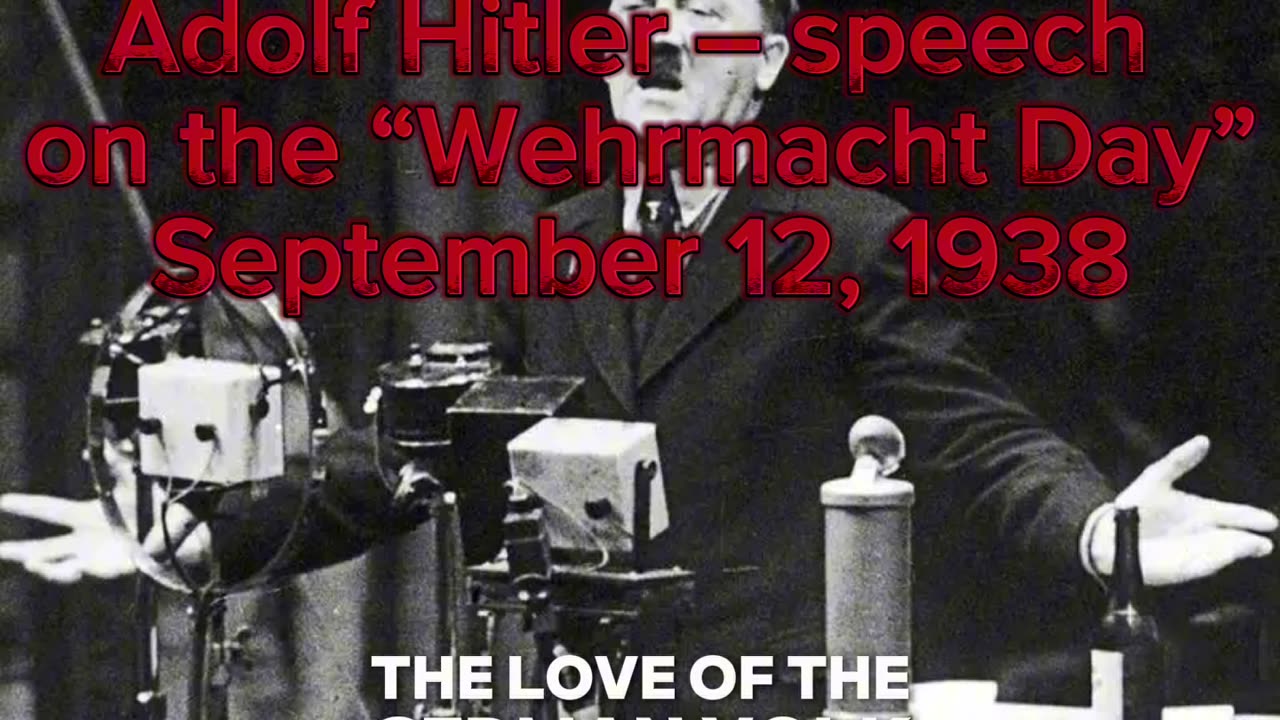Premium Only Content

Hitler's Speech on Wehrmacht Day – September 12, 1938
Background Leading Up to Hitler's Speech on Wehrmacht Day – September 12, 1938
Nazi Military Expansion: By 1938, Adolf Hitler had already begun a significant military buildup, in violation of the Treaty of Versailles. The Wehrmacht, Germany's armed forces, had grown considerably in size and strength.
Anschluss with Austria: Earlier in March 1938, Germany had successfully annexed Austria in the Anschluss, further demonstrating Hitler’s aggressive foreign policy and his vision of a Greater Germany.
Munich Agreement: The Sudetenland crisis was reaching its peak, with tensions high between Germany and Czechoslovakia. The Munich Agreement, which would allow Germany to annex the Sudetenland, was just weeks away from being signed on September 30, 1938.
Nationalist Sentiment: Hitler’s speeches during this period were designed to bolster nationalist sentiment, to justify his expansionist policies, and to emphasize the strength and unity of the German nation under Nazi rule.
Hitler's Speech on Wehrmacht Day – September 12, 1938
On September 12, 1938, Adolf Hitler delivered a speech on Wehrmacht Day, a day dedicated to showcasing the might of Germany’s armed forces. This speech was aimed at both inspiring the German people and sending a message to the international community.
Key Points of Hitler's Speech:
Celebration of the Wehrmacht: Hitler began by praising the Wehrmacht, emphasizing its strength, discipline, and the loyalty of its soldiers. He highlighted the role of the military in protecting the nation and ensuring its security.
National Unity: He stressed the importance of national unity and the collective effort required to maintain Germany's strength. Hitler framed the Wehrmacht as a symbol of national pride and unity, embodying the spirit of the German people.
Condemnation of Versailles: As in many of his speeches, Hitler condemned the Treaty of Versailles, portraying it as an unjust imposition that sought to weaken Germany. He argued that the rearmament of the Wehrmacht was a necessary step in reclaiming Germany’s sovereignty and dignity.
Defense of Expansionist Policies: Hitler justified Germany's recent actions, including the annexation of Austria, as steps towards uniting all ethnic Germans under one Reich. He claimed these moves were peaceful and supported by the local populations.
Sudetenland Crisis: Without directly mentioning the ongoing Sudetenland crisis, Hitler alluded to the rights of ethnic Germans living outside Germany. He insisted on the need for their protection and self-determination, setting the stage for the upcoming Munich Agreement.
Military Preparedness: Emphasizing the importance of military preparedness, Hitler argued that a strong Wehrmacht was essential for deterring potential aggressors and ensuring peace through strength. He insisted that Germany sought peace but was prepared to defend itself if necessary.
Call to Support the Wehrmacht: Hitler called on all Germans to support the Wehrmacht, not only through enlistment but also through moral and material support. He framed this support as a patriotic duty essential for the nation’s security and future.
Analysis:
Hitler’s speech on Wehrmacht Day was a strategic effort to solidify domestic support for his military policies and to send a clear message of strength to the international community.
Promotion of National Pride: By celebrating the Wehrmacht, Hitler aimed to instill a sense of national pride and unity among the German people. The military was portrayed as a guardian of the nation, reflecting the collective strength and determination of the German populace.
Rejection of Versailles: The condemnation of the Treaty of Versailles was a recurring theme in Hitler’s rhetoric. By portraying the treaty as an unjust and oppressive measure, Hitler sought to justify his regime’s rearmament and territorial ambitions as necessary steps towards national restoration.
Justification of Expansion: Hitler’s justification of recent expansions, particularly the Anschluss with Austria, was framed in terms of self-determination and national unity. This argument was intended to legitimize his aggressive policies and to preemptively defend against international criticism.
Preparation for Future Actions: The speech subtly prepared the German people for the possibility of further territorial expansions, particularly regarding the Sudetenland. By emphasizing the rights of ethnic Germans and the need for military preparedness, Hitler set the stage for future actions.
Call to Duty: The call for support of the Wehrmacht was designed to mobilize the entire nation behind the military effort. By framing this support as a patriotic duty, Hitler aimed to ensure widespread backing for his regime’s policies and to foster a sense of collective responsibility.
Overall, Hitler’s speech on Wehrmacht Day on September 12, 1938, was a calculated effort to reinforce the Nazi regime’s militaristic and nationalist agenda. By celebrating the Wehrmacht, condemning the Treaty of Versailles, justifying recent territorial expansions, and calling for national unity and support, Hitler aimed to strengthen domestic support and to project an image of strength and determination to the international community. This speech was a key part of his strategy to prepare Germany for further aggressive actions while maintaining a facade of seeking peace through strength.
-
 8:00
8:00
Congressman Eli Crane
14 hours agoThe D.C. Crime Problem | Democrats' Greatest Lies – Vol.2
17.1K8 -
 17:54
17:54
Dr Disrespect
17 hours agoDR DISRESPECT vs VAN DAMME in Hitman 3
72.8K11 -
 2:05:26
2:05:26
Side Scrollers Podcast
19 hours ago4Chan SUES UK Government + Craig Has Mental Illness Fatigue + Knight Rider REBOOT | Side Scrollers
32.4K8 -
 19:26
19:26
GritsGG
1 day agoChat Picked My Hair Color! All Pink Loadout & Operator Challenge!
28.3K4 -
 10:32
10:32
Nikko Ortiz
1 day agoFunniest Fails Of The Month
56.7K8 -
 1:27:34
1:27:34
TruthStream with Joe and Scott
4 days agoArchitect Richard Gage: 911 truths and more #482
32.7K7 -
 LIVE
LIVE
Lofi Girl
2 years agoSynthwave Radio 🌌 - beats to chill/game to
203 watching -
 56:48
56:48
The HotSeat
14 hours agoI'm NOT Sorry! Guns Aren’t the Problem—Godless Culture Is
37.2K30 -
 9:43
9:43
The Pascal Show
16 hours ago $0.95 earnedWHOA! Annunciation School Sh**ter Identified... Heartbreaking & Insane
8.82K2 -
 22:42
22:42
Liberty Hangout
10 hours agoCollege Democrats Say Gangs Are GOOD!
82.6K72